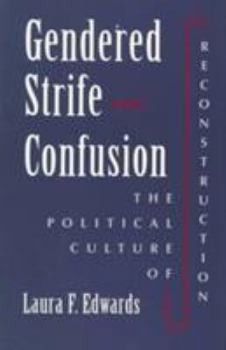Gendered Strife & Confusion: The Political Culture of Reconstruction
Select Format
Select Condition 
Book Overview
Exploring the gendered dimension of political conflicts, Laura Edwards links transformations in private and public life in the era following the Civil War. Ideas about men's and women's roles within households shaped the ways groups of southerners--elite and poor, whites and blacks, Democrats and Republicans--envisioned the public arena and their own places in it. By using those on the margins to define the center, Edwards demonstrates that Reconstruction...
Format:Paperback
Language:English
ISBN:0252066006
ISBN13:9780252066009
Release Date:April 1997
Publisher:University of Illinois Press
Length:400 Pages
Weight:1.20 lbs.
Dimensions:0.8" x 6.0" x 9.0"
Customer Reviews
1 rating
A Fresh Perspective on the Reconstuction South
Published by Thriftbooks.com User , 24 years ago
Laura Edwards adds another dimension to Reconstruction history with her community study of Granville County, North Carolina. Edwards uses gender and political analysis to show how reconstruction politics penetrated into private life. According to Edwards, elite white men viewed black men, and white and black women as dependents in the antebellum South. The Confederacy's defeat and the subsequent reconstruction of the former Confederate states endangered this existing system. Edwards uses post-war Granville County as a case study of white elite attempts at maintaining the antebellum political system. What sets Edwards' scholarship apart, however, is her examination of family and gender relations, as opposed to strictly political evidence. The accounts Edwards uses are both compelling and effective. This makes this book an important addition to reconstruction history, as well as an enjoyable and captivating read. The book is full of new evidence, as well as interesting revisions of previously used sources. Her deft analysis of post-war women's literature provides examples of prevalent gender roles. Moreover, Edwards argues that the Knights of Labor was created in order to reinforce these same roles. This books is intriguing, but one must resist the temptation to see Granville County as the entire South. Edwards provides an effective framework, but her study only speaks for one county in North Carolina. This does not, however, diminish the importance of this book, or the influence it will no doubt have on future scholarship. Although small in scope, Edward's monograph serves as a refreshing analysis of one section of the Reconstruction South. This book is a must read for students of Reconstruction history or women's history, or those interested in a refreshing new perspective on postbellum North Carolina.





